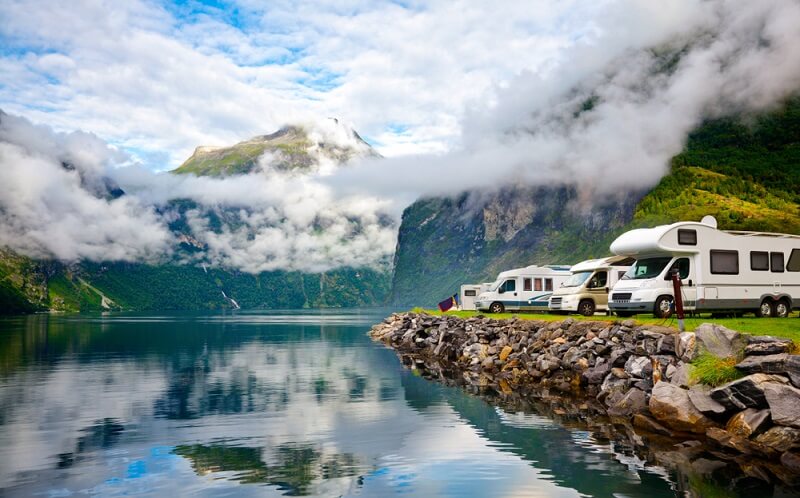


Your recreational vehicle (RV) is just as susceptible as your house or car to damage from perils such as storm, theft, fire, and accidents, but standard auto and home insurance policies typically do not cover recreational vehicles. However, some auto insurance companies may allow you to add an RV coverage endorsement to your auto insurance policy. Such a rider would only cater to the vehicle aspect of your motorhome, leaving the home component uninsured.
This is where a standalone RV insurance policy comes in handy. It is worth noting that not all RV insurance policies are created equal. Keeping this in mind, here’s a guide to help you choose the right RV insurance for your needs.
Disasters such as wildfires can destroy your RV and cost you a lot of money to repair or replace it. For instance, according to the U.S. Fire Administration (USFA), about 3,700 fires reported between 2016 and 2018 involved recreational vehicles, and they resulted in over $58 million worth of losses. In case such a disaster befalls you, paying for repairs or purchasing a new RV out of pocket can be a large financial drain. The good news is that RV insurance is a policy that provides coverage for your motorhome, camper, or travel trailer against perils such as vandalism, weather-related incidents, collision, and fires. In case an unfortunate event damages your RV, this policy will cover the costs of repair or replacement, depending on what type of coverage it is.
The federal government requires all US motorists to have auto liability insurance, except those in New Hampshire, per the Connecticut General Assembly (CGA). This means that, unless you live in New Hampshire, you should at least carry liability insurance for your RV. Even so, RV insurance is required if you fall in these categories:
• You have an outstanding loan on your RV.
• RV insurance is mandatory in your favorite campground.
• You want to shield your recreational vehicle from damage.
• You intend to protect your finances.
The following are a few types of RV Insurance:
• Third-party liability coverage, which basically covers bodily injuries and property damage that your RV causes to third parties.
• Personal injury protection coverage, which covers you in case of an RV accident that leaves you injured.
• Full-time RV insurance – This policy covers you in case you live in your RV full-time. It also pays for alternative accommodation in case your RV gets damaged.
• Uninsured motorist policy, which pays for damages caused by an uninsured driver.
• Personal property insurance, which pays for damages on your personal property inside the RV.
A standard RV insurance policy offers:
• Collision Coverage – It pays for damages resulting from a collision involving your RV.
• Medical Expenses Coverage – In case you get injured in your recreational vehicle, this policy will pay for the medical costs required.
• Full-Timer’s Personal Liability – This coverage protects you from lawsuits and claims in case a third party gets injured in your RV.
• Total Loss Replacement – If a severe disaster such as wildfire damages your RV beyond repair, the total loss replacement coverage will pay for the cost of replacing your totaled RV with a new one.
• Personal Property Insurance – This mostly applies to those who live in their RVs full-time while keeping valuable belongings in them. In case of theft, vandalism, or property damage of any kind, this policy will pay for the resulting loss.
• Comprehensive Coverage – This policy provides comprehensive coverage for damages resulting from perils such as fires, floods, vandalism, and falling objects.
• Secured Storage Policy – Unlike most insurance policies which provide coverage when the RV is in use, this policy protects your recreational vehicle while in storage.
• Roadside Assistance – This policy covers costs associated with towing and roadside servicing if your RV breaks down on the road.
• Personal Attachments Coverage – This policy will cover attachments such as satellite dishes and awnings that didn’t come with the RV during purchase.
While all these coverages are important, it is prudent to evaluate your insurance needs and only purchase what you require. This will not only help you avoid over-insurance but also lower your RV insurance premiums.
The cost of RV insurance typically depends on the size of coverage you purchase. For instance, if you only want basic liability insurance, you will pay less than if you want comprehensive coverage. Other factors that may affect the cost of RV insurance include, among others: state laws, the location where you live or the vehicle is stored, the type of recreational vehicle, and other inclusions.
RV insurance costs also vary from one insurance provider to another. With this in mind, you should consider comparing quotes from different insurance companies until you find the policy that suits your needs and budget. Remember, you can also lower your RV insurance costs by asking for discounts, raising your deductible, changing your RV model, and installing safety features, according to the Insurance Information Institute (III).
Follow this ultimate RV insurance guide to find the right RV insurance in Bristol, CT. For all of your RV coverage needs and to keep all of your recreational vehicles protected, contact our experts at C.V. Mason Insurance Agency in Bristol, Connecticut. We will work with you to ensure you have the right amount of RV insurance coverage, all at the right price to fit your budget.